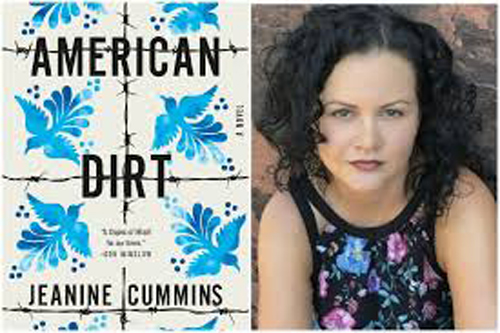I recently heard the news of a new release book called ‘American Dirt’ by Jeanine Cummings. From what I recall it is a Mexican-American immigrant story. I didn’t think much about it again until I started reading an article I came across about the book tour being canceled due to security concerns. I am always curious to see what would prompt a publisher to cancel a book tour.
What I have now learned is that the author of the book is not Mexican and some critics question whether she should be the one to write about the Mexican immigrant story. When I first heard some of the backlashes I thought it was because the author was white and that she may be doing the typical fetishizing of the immigrant experience. So it brings into question – who has the right to write about minority experiences such as immigration? Does the fact that the book is fiction play a part in this? But when I went online to research further, I saw a presentation from the author stating that her father is Puerto Rican and that she identifies as Latina. So is the backlash over the fact that she is not an immigrant with first-hand knowledge? The other concern is that in the current climate of extreme white supremacy that has promoted propaganda particularly about immigrants, immigrants held in cages at the border, … Does this book add fuel to the fire? The question in my mind is whether is it acceptable to promote a book that poorly depicts these marginalized people?
A point raised in an NPR podcast titled “What The Controversy Over ‘American Dirt’ Tells Us About Publishing And Authorship,” is that the LatinX community is also angered with the publishing industry in general. The barriers for people of color in the publishing industry are still very high.
According to the latest diversity survey from Lee & Low Books, which was released on Tuesday, nearly 80 percent of books publishers and agencies are white. Latinos make up 6 percent of the industry as a whole and 3 percent of the industry’s leadership.
This book was also picked up and endorsed by Oprah Winfrey for her book club prior to all of the backlash. We all know that if you get that highly coveted endorsement, your sales are guaranteed to go through the roof!
Eighty-three prominent writers from diverse backgrounds, including Jennine Capó Crucet, Alexander Chee, Nicole Chung and Lilliam Rivera, signed a letter addressed to Oprah Wednesday, urging the media mogul to rethink her promotion of the novel.
CBS News ‘American Dirt’ book tour canceled by publisher because of safety concerns’
Since then, Oprah has released a video saying that she is listening and would like to have a deeper discussion. So where does this leave us? I think that the book will do well in sales now from all of the controversies because people will be curious about what details are in the book. But I am hoping that many things will occur and some already have begun. For example, at least two news agencies featured this book and backlash on-air, NPR recorded a wonderful podcast on this book and backlash, Oprah will be leading some sort of discussion to look more deeply into this matter.
The reason the publishing industry cited for canceling the rest of the book tour is for the safety of the author. Now that one really hits hard. It had to take a lot for the publisher to cancel the rest of the tour and I am curious what are the contents from these threats. It also piques my interest in what the book says.
My hope is that all the publishing companies use this experience to learn and grow, and recognize the discrepancies and lack of diversity in the authors and content they publish, then move to improve their policies and practices to create more equitable opportunities for authors of color as well as annually track their progress in these endeavors to hold themselves accountable for the needed change.
I don’t want to discourage writers from writing about things they are passionate about even if they are not the subject of the stories. But if they are not, I ask that they make a point to mention it in their author’s note. I think we all have to work together to tell stories that create a dialogue that moves us to changes that lift us all. I think that if a person comes from privilege and not from the group that they write about, then they should use some of the profits from their stories, to help the very people whose stories they are trying to shed light on. If they don’t then they are just out to make a profit and that simply isn’t right. This issue was raised in the NPR interview when they talked about the decor at the book release when they used pink barbwire as the centerpieces. Such insensitivity only demonstrates the commodification of oppression.
However, in this situation, I have no reason to doubt the author’s claim that she is part of the LatinX community. Her mother may be white but her father is Puerto Rican and she identifies as a Latina. So it raises all sorts of issues of who is and isn’t a part of the LatinX community. Does mixed heritage disqualify people from belonging?
I am grateful that this book is inadvertently acting as a catalyst to larger discussions of race, inclusion, privilege, and the publishing industry. It is an opportunity for true change. Let’s see what happens next.

